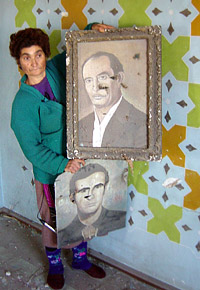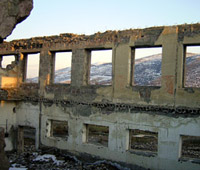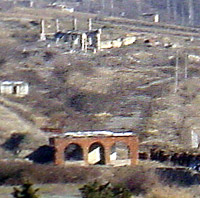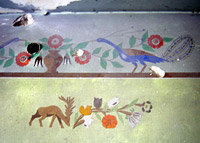
The Border Between Past and Future
Elya Hovhanissyan lives very close to the border. The border separates Armenia and Azerbaijan or Tavush and Tovuz, or simply, Aygepar and Alibeyli. Although there are still obvious signs of artillery damage, the house seems to be a symbol of a good past and an uncertain future. The size of the structure suggests that its owners were once successful workers.
"My husband and his father used to have metal workshops way back then," said Elya, "All the gates and water tanks in the village across from ours - Alibeyli - were made by my husband and his father."
The metal business run by Elya's husband and father-in-law did not limit itself to Alibeyli. "Everybody knew their work, both at the Tovuz Station (some 20 kilometers from Aygepar) and everywhere else," said the owner of the now-ruined house, proudly adding that there were not just business ties, but family ties as well.
We looked out a window on the second floor. A number of crumbling structures could be seen on the stretch of land between this house and the neighboring Azeri village.
 |
 |
 |
 |
"Do you see those ruined walls there? That used to be the cannery. All that's left now are the walls." She then pointed at a structure with red arches. "That used to be the bus station. People would take buses to the Tovuz Station, and go to trade from there." I pointed to a few granite pillars scattered some distance away from the station, "What's that?"
"That's not on our land, it's theirs. It used to be a restaurant; they used to do barbecue. It was called Vagif's," the woman said, smiling.
All of the older residents of Aygepar were sure to speak of Vagif's , in order to emphasize the friendly relations that existed with their neighbors. They said that it was a small barbecue stand at first, but slowly grew until it became a two-floor restaurant. "They would greet us with great honor," remembered Arakel Anikyan, "If for some reason we didn't like the meat, they would slaughter another animal just for us." This restaurant, located on the busy road that joined the two Soviet republics, was a popular meeting point for Armenians and Azeris.
"Weren't there ever any fights here?" I asked.
"No, what fights?" Arakel Anikyan said, surprised. "Actually, yes, there were fights, but only over who was treating."
The question "Where is Vagif now, do you have any idea?" met with shrugs whenever I asked it. "I don't know about Vagif, but there was another boy with him, Rafik, who used to prepare the barbecue. He commanded Azeri battalions during the war. I think he died later, a mine got him," said Albert Grigoryan, director of the distillery. He remembered that he and Rafik, once friends, used to talk to each other even when they were on opposing sides during the war. "Who are we fighting for, why are we fighting? Let's not fire at each other," they would say to one another.
Elya Hovhanissyan also remembered Rafik. She said that he had been a good worker, a welder, and that he had worked with them when they were building their house. "During negotiations he would ask which of us were still alive. They told him 'Hey, you know that you destroyed all the houses here,' and he said 'What could I do? Why is it my fault? I feel even worse than you that your houses were destroyed.'" she recalled.
Elya lives alone in this crumbling house. Her husband died in 1985. She has a daughter and two sons. Her daughter is married. One of her sons lives in Rostov with his family, while the other is a professional soldier, who spends 14 days a month on border duty.
This lonely woman looks out her window everyday, at the village of Alibeyli, which has been in a foreign country for the past 16 years. The neighboring village causes conflicting emotions within her - memories of the past and the personal, friendly relationships that existed as well as horrible recollections of the war. "We were directly opposite their village," she said, "Whenever there was military action against us, our house was always hit. There is no corner of our house that wasn't shelled by a tank. Those tanks completely ruined our house. The tank would shell a part of the house and we would come and see that nothing was left."
Elya's house is like a lost paradise. The burns on the plaster and pieces on the floor suggest that the walls used to be decorated with pictures of magnificent birds and flowers. When they were building their little paradise, they had no idea that there could be a tragedy that would turn friends and neighbors against each other, into two opposing armies doing battle.
Elya replied to the question "Who is to blame?" with a question of her own, "You don't know? Neither the Armenians, nor the Azeris. Everybody knows perfectly well whose fault this is," she said angrily.
She lived in Rostov with her son for two years. She said that they had Azeri neighbors there who also greatly regretted what had happened. "They felt very sorry too. They said that we used to be friends, we used to live together, break bread together, why did this happen?" Then she recalled her friends at the Tovuz Station. "One was Mejit. They were very nice people, very nice. We were very good friends." Elya said that Mejit's wife had gotten in contact through a mutual acquaintance. "She'd said that she wanted to come see us. She said that she wasn't afraid of Armenians, and could cross the border. But she also said that she was afraid of her fellow Azeris, and that they would probably not let her across."
To be continued
 Videos
Videos Photos
Photos
Write a comment